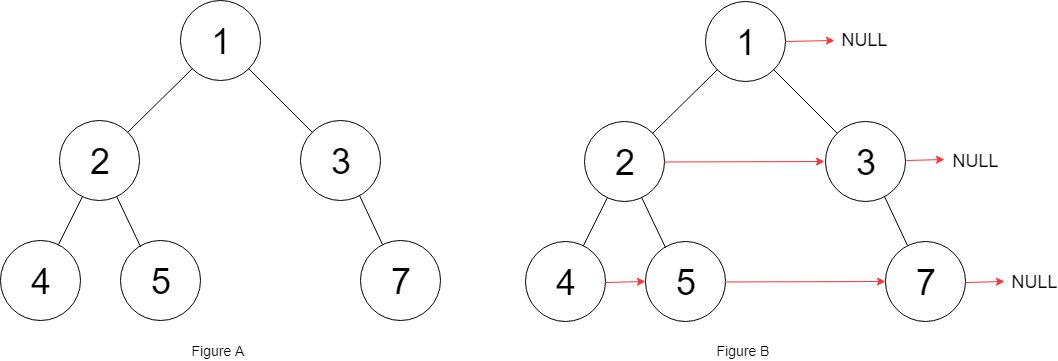Algorithm
Problem Nmae: 117. Populating Next Right Pointers in Each Node II
Given a binary tree
struct Node {
int val;
Node *left;
Node *right;
Node *next;
}
Populate each next pointer to point to its next right node. If there is no next right node, the next pointer should be set to NULL.
Initially, all next pointers are set to NULL.
Example 1:

Input: root = [1,2,3,4,5,null,7] Output: [1,#,2,3,#,4,5,7,#] Explanation: Given the above binary tree (Figure A), your function should populate each next pointer to point to its next right node, just like in Figure B. The serialized output is in level order as connected by the next pointers, with '#' signifying the end of each level.
Example 2:
Input: root = [] Output: []
Constraints:
- The number of nodes in the tree is in the range
[0, 6000]. -100 <= Node.val <= 100
Code Examples
#1 Code Example with C Programming
Code -
C Programming
void connect(struct TreeLinkNode *root) {
struct TreeLinkNode *v, *h, *prev, *left;
prev = NULL;
left = root;
v = left;
while (v) {
h = v;
do {
if (h->left) {
if (prev) {
prev->next = h->left;
} else {
left = h->left;
}
prev = h->left;
}
if (h->right) {
if (prev) {
prev->next = h->right;
} else {
left = h->right;
}
prev = h->right;
}
h = h->next;
} while (h);
v = left;
prev = left = NULL;
}
}
Input
Output
#2 Code Example with C++ Programming
Code -
C++ Programming
class Solution {
public:
void connect(TreeLinkNode *root) {
if(!root) return;
deque < TreeLinkNode*>cur;
dequenext;
cur.push_back(root);
while(!cur.empty()){
TreeLinkNode* node = cur.front();
cur.pop_front();
node->next = cur.empty() ? NULL : cur.front();
if(node->left) next.push_back(node->left);
if(node->right) next.push_back(node->right);
if(cur.empty()) swap(cur, next);
}
}
};
Input
Output
#3 Code Example with Java Programming
Code -
Java Programming
class Solution {
public Node connect(Node root) {
Queue queue = new LinkedList<>();
queue.add(root);
queue.add(null);
while (queue.peek() != null) {
int size = queue.size() - 1;
while (size-- > 0) {
Node removed = queue.remove();
removed.next = queue.peek();
if (removed.left != null) {
queue.add(removed.left);
}
if (removed.right != null) {
queue.add(removed.right);
}
}
queue.remove();
queue.add(null);
}
return root;
}
}
Input
Output
#4 Code Example with Javascript Programming
Code -
Javascript Programming
const connect = function(root) {
if (root == null) return null
const cur = [root]
while (cur.length) {
const len = cur.length
for (let i = 0; i < len; i++) {
const el = cur.shift()
if (i === len - 1) el.next = null
else el.next = cur[0]
if (el.left) cur.push(el.left)
if (el.right) cur.push(el.right)
}
}
return root
}
Input
Output
#5 Code Example with Python Programming
Code -
Python Programming
class Solution:
def connect(self, root: "Node") -> "Node":
dummy = Node(-1, None, None, None)
tmp = dummy
res = root
while root:
while root:
if root.left:
tmp.next = root.left
tmp = tmp.next
if root.right:
tmp.next = root.right
tmp = tmp.next
root = root.next
root = dummy.next
tmp = dummy
dummy.next = None
return res
Input
Output
#6 Code Example with C# Programming
Code -
C# Programming
namespace LeetCode
{
public class _0117_PopulatingNextRightPointersInEachNode2
{
public TreeLinkNode Connect(TreeLinkNode root)
{
TreeLinkNode cur = root;
while (cur != null)
{
TreeLinkNode nextHead = null;
TreeLinkNode nextPrevious = null;
while (cur != null)
{
if (cur.left != null)
{
if (nextPrevious != null)
nextPrevious.next = cur.left;
else
nextHead = cur.left;
nextPrevious = cur.left;
}
if (cur.right != null)
{
if (nextPrevious != null)
nextPrevious.next = cur.right;
else
nextHead = cur.right;
nextPrevious = cur.right;
}
cur = cur.next;
}
cur = nextHead;
}
return root;
}
}
}
Input
Output
